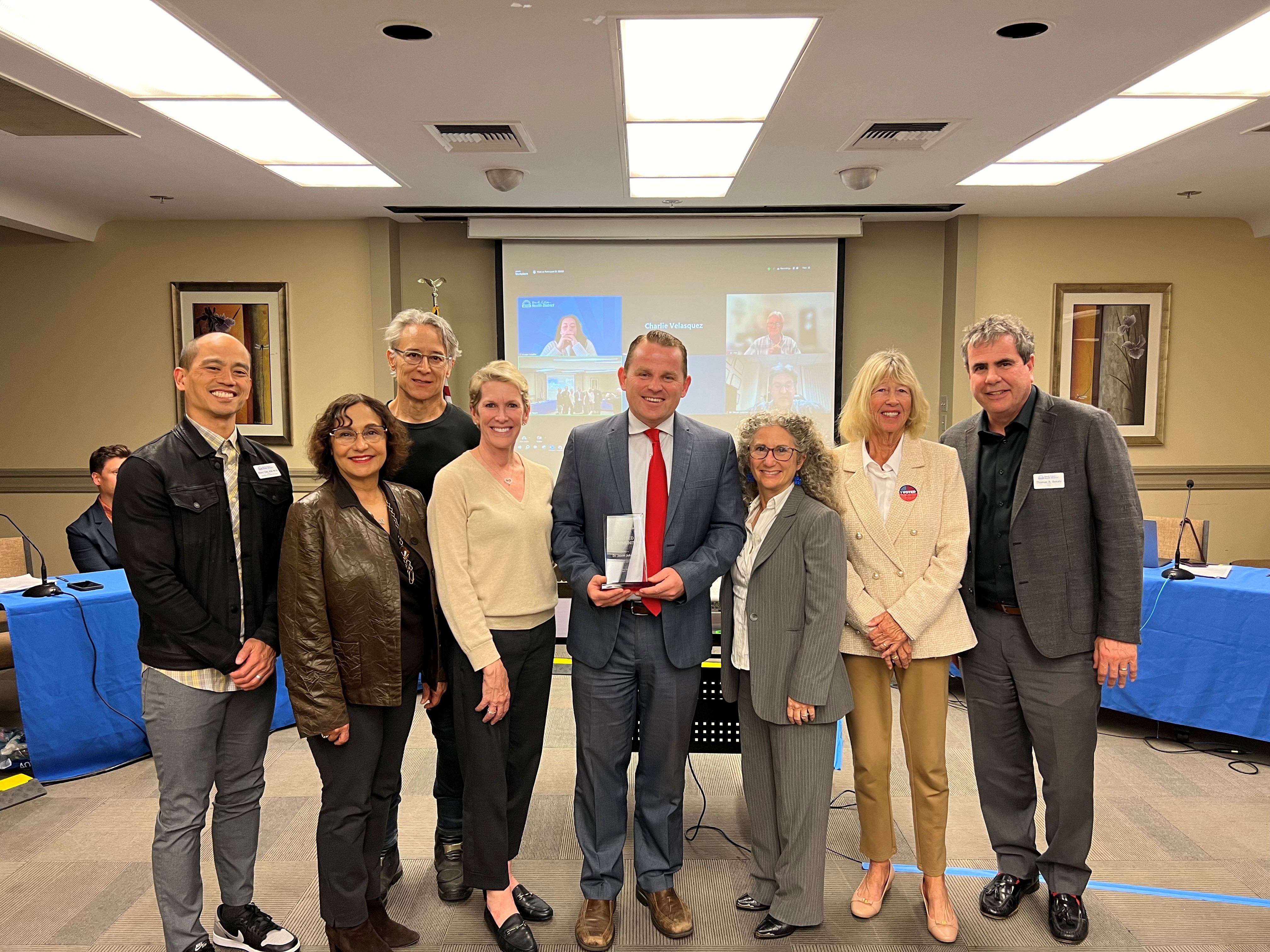
Suze Orman sounded like the Phyllis Diller of finance. She ripped real estate, ripped big banks, and didn’t have much good to say about stocks, bonds or even gold. But she still got plenty of laughs last Wednesday at the Redondo Beach Performing Arts Center, often at the expense of the Distinguished Speaker Series subscribers she was addressing.
The CNBC host, whom Time magazine listed as one of the 100 most influential people in the world, began her talk by recalling her friendship with “one of the world’s greatest investors,” Steve Jobs, who died that day.
“I was a waitress at the Buttercup Bakery in Berkeley and he and Steve Wozniak used to come in and tell bizarre stories about their crazy gadgets. Their real money, they thought, was in their 1-800-Dial-A-Joke. Wozniak was so proud of it. Jobs was always complaining that his parents thought he was nuts. I gave them free coffee because they didn’t have any money.”
Her kindness was repaid, she said, when Apple went public. Wozniak’s sister received one million shares of the stock and invested it with Orman, who had left her waitress job to become a Merrill Lynch broker.
The evening’s biggest laughs, and groans, came at the expense of a subscriber who asked, “How do I get my wife to participate in budgeting and cost cutting? She refuses to change her spending habits, though our income has declined.”
Orman called the man to the stage. When he told her his wife had refused to accompany him to her talk, a friend of his in the audience yelled out, “Call her.” The man did.
When the wife answered, Orman grabbed the phone, put it on speaker phone, and said, “This is Suze Orman. Your husband is on stage with me in front of 1,500 people who are listening to our conversation.”
“I’m going to kill him,” the wife responded.
“You need to stop spending money to impress people you don’t like…Otherwise, I’d advise you to divorce him,” Orman said.
Orman reminded the wife that money is a leading cause of divorce.
“Here’s the thing, just vow you’ll work with him and stop spending money. If you don’t, I’ll give him my number so he can call and we can have this conversation on national TV. We love you.”
Orman hung up and the man hastily retreated from the stage. After that, no one who had submitted a question responded to Orman’s requests that they identify themselves.
Real estate – not in our lifetime
The audience’s groans were only slightly less audible when Orman talked about real estate, and there were no laugh lines to soften her comments.
“Eight of the top 10 cities for foreclosures are in California. Prices have come down dramatically. You’re thinking, now is the time to invest in real estate. You can rent the property out for retirement income.”
“Don’t you dare,” she said.
She predicted the general economy will rebound in 2015, but real estate will remain depressed for another decade – until 2023.
She gave three reasons.
The first was the shadow inventory of foreclosed homes.
“Currently, there are 12 million more foreclosures than are on the books. Banks don’t want more foreclosed properties on the books because it would make the situation look even more horrific than it is. They’d rather have people living in the homes than foreclose and have the houses ransacked.”
Her second reason was the banks’ reluctance to make real estate loans. The banks, she pointed out several times in her talk, rewarded taxpayers for bailing them out by raising credit card interest rates to 30 percent, doubling the minimum credit card payment from 2 to 4 percent, and lowering people’s credit card limits, or canceling them.
“You lent the banks money to get them out of trouble. The banks did everything not to help Americans. Ethically, I won’t invest a penny in them, even if Bank of America’s stock were to go from $5 to $1,000.
“That said, I think eventually, they will come back. And with B of A’s stock at $5.50, there’s not much downside,” she added pointedly.
“Banks don’t want to lend,” she said. “Why? If they make a 30-year-fixed loan at 4 percent, and inflation comes back and rates go up to 8 percent, they’re stuck with the 4 percent for 30 years.
“Also, they don’t want to risk owning more real estate.”
The third strike against real estate, she said, is high unemployment.
“For real estate to go up, demand needs to exceed supply, banks need to lend and people need jobs to qualify for loans. We don’t have any of that.”
The Stock market — unhinged
“Where’s it going? I don’t have a clue. Nor does anyone else.”
“Every time we hear Europe has solved its problems, the market goes up. Every time we thinkEuropeis not able to solve its problem, the market goes down.”
“The market should be going up and down based on stock earnings. That’s not happening with this market.”
“If Europecan’t pull it out, will it affect us? It will. And chances are they won’t pull it out.
“So, where do you get your income if not from the stock market or real estate?
“Look at municipal bonds, which are at 4 to 5 percent,” she said. But then she cautioned, “However, we are in the State of California.”
She also recommended dividend paying stocks, provided the portfolio is diversified.
“You can easily get 4 to 5 percent from dividend paying stocks. But don’t put more than 5 percent in any one stock.”
Energy – a sucker’s market
“Energy stocks are not trading based on supply and demand. Energy is a manipulated market, so I say stay away from it.
Gold – if there’s a revolution
“I think gold will go from $1,630 to $2,100 by next year’s election,” Orman said. But she advised against investing more than 10 percent in gold. “Gold is not an investment. Gold is a commodity, so when you go to sell, if you have held it more than a year, it will be taxed at 28 percent, not 15 percent,” she said.
“You buy gold as a hedge, for protection, if the dollar gets weak.”
Insurance – the one thing you can be sure of
The one subject Orman was bullish on was long term care insurance.
“If I could change one thing in my life, I’d go back to when my mom was in her 70s and I would make her buy long term care insurance. She’s 96 now and she is costing me $30,000 a month. And she thinks she’s paying that with her social security.”
“Thank God I have the money. I owe it to her. I was not the best kid growing up,” Orman added.
You can do it
Orman’s harshest rebuke was toward people who don’t take responsibility for their finances.
“Where can I find a great financial advisor? Look in the mirror. No one cares more about your money than you. You work 60 hours a week to earn it, so make take time to handle it.”
“I grew up on 81st in Chicago. I was the only white face in a sea of black. I couldn’t pronounce R’s or T’s because of a speech impediment. In school, we were seated according to our reading scores. I was in the last seat of the last row. I knew I was stupid, so why try to be anything. I went to theUniversityofIllinoisand never got a grade above a C. I borrowed $1,500 to buy a Ford Econoline and set out to see the world. I lived in the van on a street inBerkeleyfor four months until I landed my dream job, as a waitress at the Buttercup Bakery. I was making $400 a month and thought I had hit the jackpot.
“I worked there from 1973 to ’74, and then from ’74 to ’75 to ’76, to ’77, to ’78, to ’79, to ‘80.
“Then I had the brilliant idea of owning my own restaurant and called my mom and dad and asked them to lend me $20,000.
“Suze, where will we get that kind of money?” my mom said. Mom was a secretary and soldAvonon the side, but never told anyone because she didn’t want to embarrass my dad. He was in a fire during his teen years and spent most of his time in a hospital with emphysema.
“The next day, Fred, one of my customers, asked, ‘What’s wrong, sunshine.’ Before he left, he came up to the counter with checks and napkin notes and said, “This is for people like you, to have your dreams come true. Pay it back in 10 years, no interest, if you can.”
“The checks and commitments totaled $50,000. I was shaking. I’d never seen that kind of money.”
A friend advised Orman to put the money in a money market account while she prepared to open her restaurant.
“When I walked in to Merrill Lynch I was assigned a cute broker, a former hockey player. He said, ‘How would you like to make a quick $100 a month?’ I said, ‘Sure.’”
“He had me sign some blank papers. I believed him. He wore a pinstriped suit. In two months the $50,000 was gone.”
“If that had not happened, I would not be here today. Remember, when one door closes another opens. Every no leads closer to a yes.
“Fred said I didn’t have to pay the money back. But that’s not how Suze Orman is. I decided I’d become a broker. I got dressed in red and white pinstripes and white cowboy boots.
“The Merrill Lynch broker who me said he though women should be barefoot and pregnant. But he would hire me anyway. ‘But trust me, Suze, you’ll be out in six months.’
“In my third or forth month of training, I come across a section known as the ‘customer rule.’ It says a financial advisor can’t invest a client’s money in a more speculative way than the customer understands.
“I thought ‘Wow.’ What my broker did was illegal. I got up from my cubicle and marched into my manager’s office and said, ‘You’ve got a crook working for you.
“He told me, ‘Go back to your cubicle and don’t say a word. That broker makes a lot of money for us.”
“Maybe I could have earned the money back, but what if that had happened to my grandmother or someone older who wouldn’t have a chance to earn it back.
“I sued Merrill Lynch, and though I didn’t know it at the time, they couldn’t fire me because I sued them. During the year it took to get to court, I became the number six producer in the office. Then I won my money back, plus 18 percent interest because in 1981 money market interest was in the 18 to 20 percent range, not like the zero to one percent today.
“I was able to pay everyone back, with interest. I got a letter from Fred. He had had a stroke and said the money came at a time when he needed it.
“I don’t tell you this to impress you, though you should be impressed, but to inspire you. Here is someone who couldn’t speak or read. All the murders you hear about on TV. That’s where I grew up. And now I am the most listened to personal financial advisor today. So don’t tell me you can’t manage your own money. You can.”
Actress Betty White will address Distinguished Speaker Series subscribers on Monday Nov. 7, followed by President Obama advisor David Axelrod on Jan. 9, Pulitzer Prize winning columnist Charles Krauthammer on Feb. 20, General George Stanley McChrystal on March 12, cellist Yo-Yo Ma on April 2 and Blue Zones author and Vitality City leader Dan Buettner on May 21. For more information visit SpeakersLA.com.







